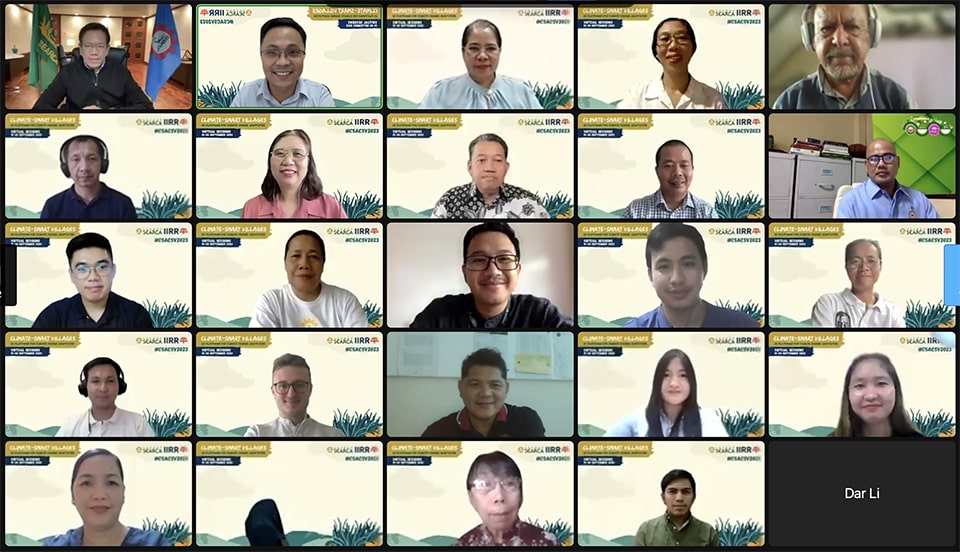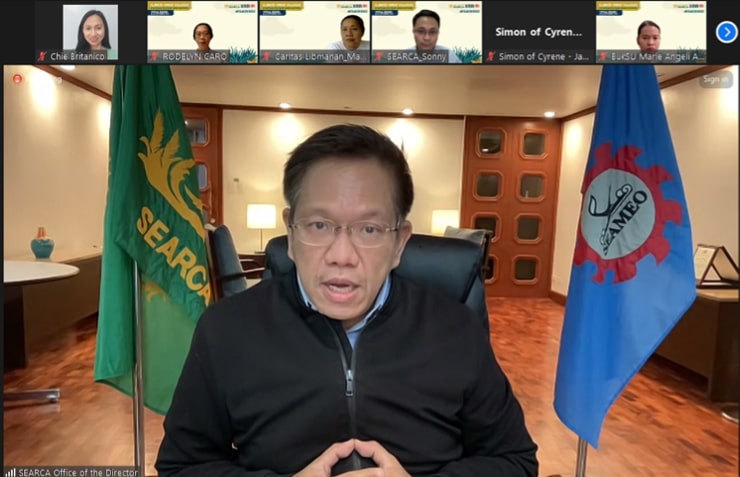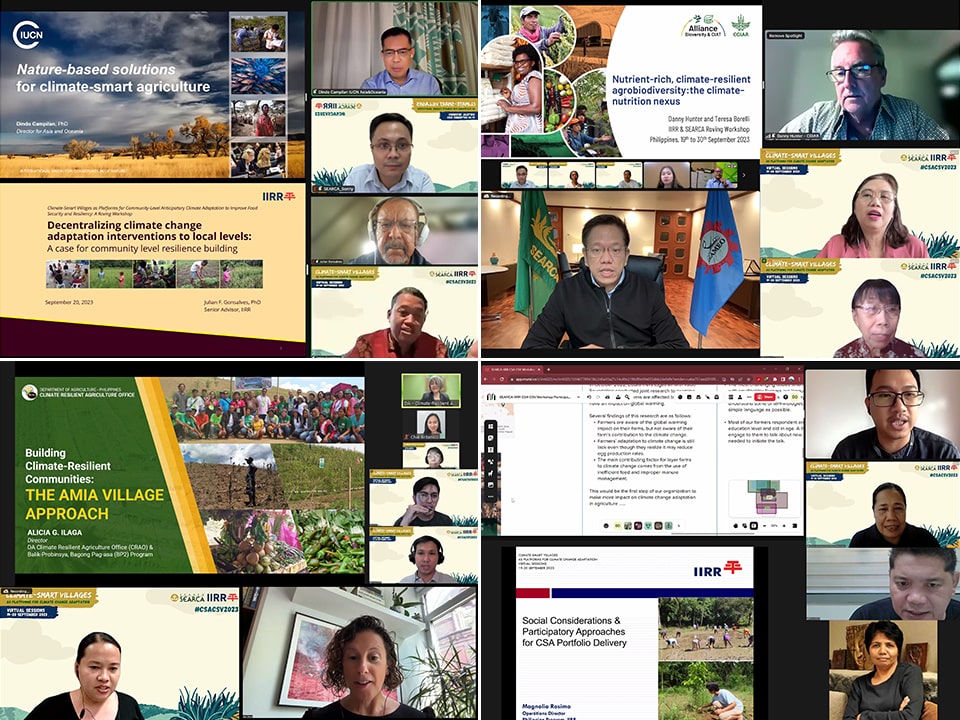The Southeast Asian Regional Center for Graduate Study and Research in Agriculture (SEARCA) and the International Institute of Rural Reconstruction (IIRR) have jointly offered virtual learning sessions on climate-smart villages (CSVs) on 19–20 September 2023 via Zoom.
 Some of the participants and members of the training management group during the first online session on 19 September.
Some of the participants and members of the training management group during the first online session on 19 September.
The sessions were part of an eight-day blended course, "Climate-Smart Villages as Platforms for Community-Level Anticipatory Climate Adaptation to Improve Food Security and Resiliency." The first module was delivered virtually, while the remaining modules will be provided onsite through a roving workshop on 25–30 September 2023.
The virtual sessions were attended by 22 participants from academic institutions, nongovernmental organizations, the private sector, and government agencies from Cambodia, Indonesia, Myanmar, the Philippines, Thailand, and Germany.
On behalf of SEARCA Director Dr. Glenn Gregorio, Assoc. Prof. Joselito Florendo, SEARCA deputy director for administration, welcomed the webinar participants. In his message, he shared that this joint activity of SEARCA and IIRR aims to enhance the capacities of participants to promote, disseminate, and advocate for local platforms for scaling inclusive forms of climate-smart agriculture (CSA) and anticipatory climate adaptation.
 SEARCA Deputy Director for Administration Joselito G. Florendo welcomes participants during the first day of the online sessions.
SEARCA Deputy Director for Administration Joselito G. Florendo welcomes participants during the first day of the online sessions.
Assoc. Prof. Florendo also highlighted the role of a village in scaling CSA, emphasizing that "it takes a village to scale up climate-smart agriculture."
Ms. Emily Monville-Oro, IIRR acting regional director for Asia, also gave a welcome message and provided an overview of the hybrid methodology used in the course. The online sessions covered various concepts on CSVs. On the other hand, the six-day roving workshops comprise field visits to Cavite, Quezon, and Laguna in the Philippines. These field visits allow participants to witness first-hand how food systems-sensitive climate change adaptation platforms are established, sustained, and scaled at community levels.
The online sessions were packed with knowledge sharing and learning from both the speakers and participants. Selected participants discussed climate change interventions of their organizations, the challenges they encountered, and the lessons they learned. It was followed by experts' presentations on CSV, agrobiodiversity, nature-based solutions, food systems, and community-based adaptation. Speakers included Dr. Julian Gonsalves, senior advisor of IIRR; Dr. Danny Hunter, senior scientist at the Alliance Biodiversity International and CIAT; Dr. Dindo Campilan, regional director for Asia and Hub Director for Oceania of the International Union for Conservation of Nature (IUCN); Dr. Alice Ilaga, director of Climate Resilient Agriculture Office of the Philippine Department of Agriculture and ASEAN Climate Resilience Network (CRN) focal point for the Philippines; Dr. Jessica Fanzo, professor at the University of Columbia in New York; and Ms. Magnolia Mosimo, operations director of IIRR.
The first day of the webinar kicked off with Dr. Gonsalves' presentation on CSVs as mechanisms for delivering and scaling gender-responsive and inclusive adaptation action. He highlighted the critical factors in CSA programming, such as village profile, land ownership, local mechanisms for financing, and local governments.
Meanwhile, Dr. Hunter discussed the climate-nutrition nexus. He noted that CSVs are essential platforms to build the capacity to produce more climate-smart foods. However, he also argued that it is not just about building the capacity of communities; there needs to be strong investments in financing as well.
Another essential element of CSA discussed in the webinar was nature. Dr. Campilan emphasized the importance of building the capacity of natural ecosystems and ecological processes in CSA. In his presentation, he discussed the nature-based solutions (NbS) for CSA. NBS, according to Dr. Campilan, considers the interconnectedness of the different ecosystems and landscapes. He noted that "it takes more than one village and probably different units of the ecosystems or the whole planet to achieve the goals of climate smartness."
 Speakers during the online sessions share their expertise in their respective fields.
Speakers during the online sessions share their expertise in their respective fields.
Presentations on the second day were delivered by Dr. Ilaga, Dr. Fanzo, Ms. Mosimo, and Dr. Gonsalves.
Dr. Ilaga introduced the Adaptation and Mitigation Initiative in Agriculture (AMIA) villages in the Philippines, which is the banner program of the Department of Agriculture to achieve its climate-resilient agriculture agenda. Dr. Ilaga provided an overview of the AMIA program's evolution, approach, development pathway, and significant milestones. She also shared lessons they learned and ways forward from the program. Among the lessons she mentioned is the critical role of local governments in the success and sustainability of the program.
Meanwhile, a recorded presentation by Dr. Fanzo highlighted the strengthening of the local food systems. Much of the nutrients in the food supply are produced in small and medium farms. However, Dr. Fanzo argued that this does not mean that the global scale of food systems is not essential. Global and local food systems are interconnected and vulnerable to shocks, such as climate and weather events, geopolitical and economic events, and mismanagement and policy changes.
For the second presentation of Dr. Gonsalves, he talked about decentralizing climate change adaptation interventions to local levels. He discussed the four household types to categorize farmers and differentiated pathways to adaptation. He also mentioned resilient agro-ecologocial systems as diverse, interconnected, complex, and stable. Furthermore, he emphasized focusing on the adaptation process by nurturing experimentation and fostering group processes.
Dr. Gonsalves also reiterated the landscape approach in CSA that Dr. Campilan mentioned and the importance of access to land and other resources, not just technologies, in adopting CSA. To make agriculture great again, Dr. Gonsalves reminded the participants to diversity, intensify, integrate, and sustain.
The last presentation by Ms. Mosimo focused on how IIRR operationalizes the concept of community-based adaptation (CBA) as a process where people collectively work to increase their adaptive capacities. An essential component of CBA is participatory action research (PAR), which has two key processes: understanding vulnerabilities and testing CBA options. Ms. Mosimo discussed the steps of conducting PAR and posed some questions for the participants. Finally, she talked about how IIRR implements the farmer learning group and the provision of an innovation fund.
For the roving workshops, participants will visit sites in Bailen, General Emilio Aguinaldo in Cavite, Pagbilao and Guinayangan in Quezon, and Los Baños, Laguna. The other three course modules will likewise be tackled during the roving workshops.